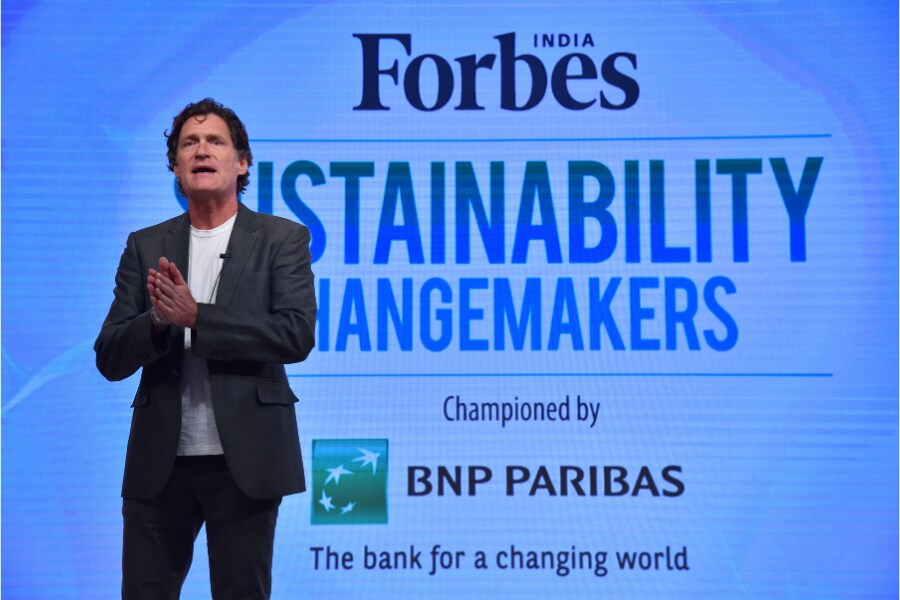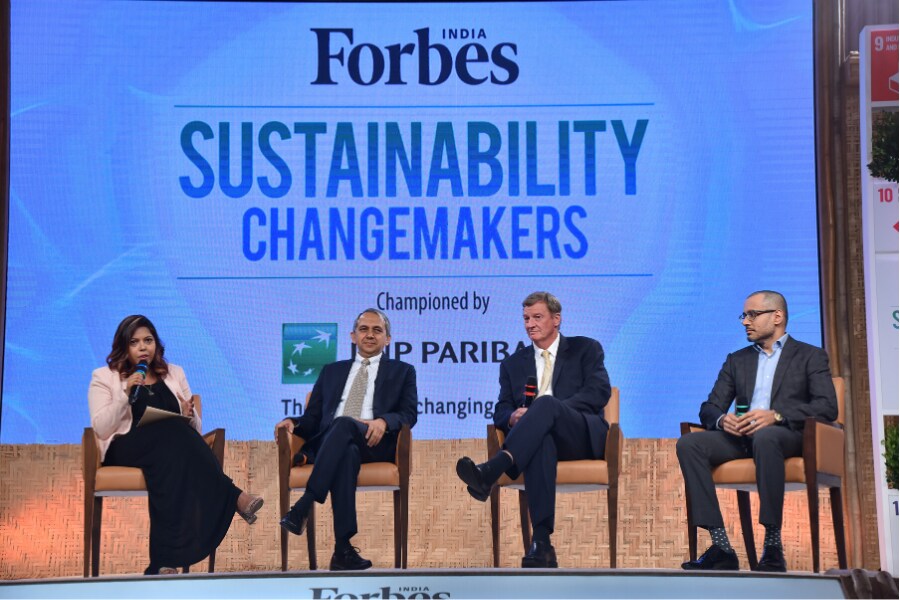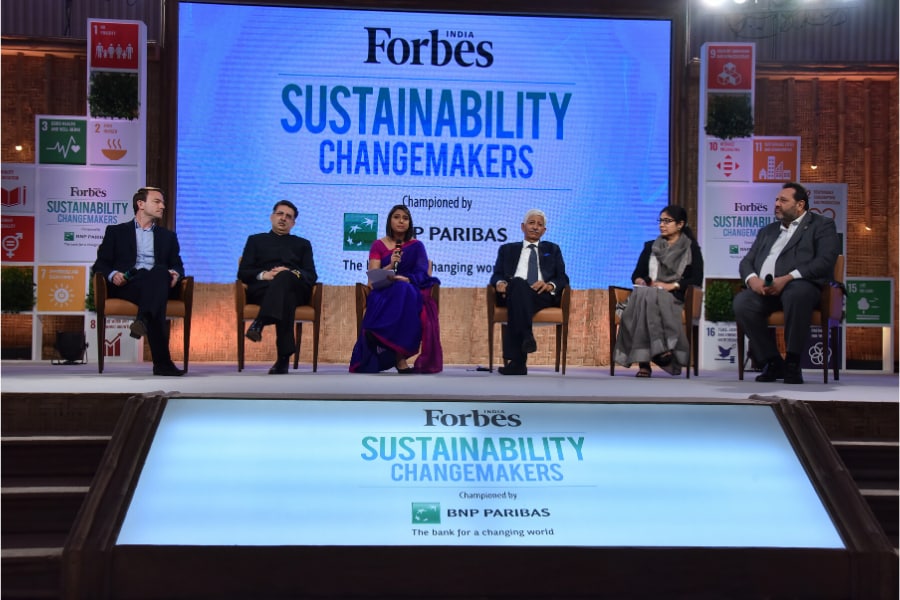Addressing India's Twin Water & Waste Crises
The 2020 Forbes India Sustainability Changemakers summit was held in Mumbai recently, bringing together policymakers, corporates, academicians and thought leaders, to address the looming water and was
.png?im=Resize,width=600,aspect=fit,type=normal)
.png?im=Resize,width=600,aspect=fit,type=normal)
.png) Franciska Decuypere, Head of Territory, BNP Paribas
Franciska Decuypere, Head of Territory, BNP Paribas
To address India’s twin water and waste management crises, Forbes India held its annual Sustainability Changemakers summit, championed by BNP Paribas, in Mumbai earlier this month. The evening brought together thought leaders, corporate leaders and policymakers to discuss the opportunities and challenges on the path of sustainable and scalable solutions to make India water sufficient and waste-free.
Power of storytelling
The event commenced with a powerful and thought-provoking keynote address by award-winning filmmaker and environmentalist, Craig Leeson. Leeson who is also the global sustainability ambassador for BNP Paribas, threw light on the gargantuan plastic waste problem that the world faces today and the direct correlation between degradation of the environment and deterioration of human health, especially of children.
The maker of the hard-hitting documentary film ‘A Plastic Ocean’, went on to screen the trailer of his next film ‘The Last Glaciers’, which focusses on the adverse effects of climate change. The trailer was shown in India for the first time at the Forbes India Sustainability Changemakers summit.
Leeson who has met Greta Thunberg, the Swedish teenage climate activist who has shot to fame globally for her ‘Fridays for Future’ movement, said, “She didn’t ask for this fight”, adding that it will be children who will find the solutions to the problems created by their previous generations. Craig Leeson, award-winning filmmaker, journalist and global sustainability ambassador, BNP ParibasBrainstorming sustainable solutions for India’s water crisis
Craig Leeson, award-winning filmmaker, journalist and global sustainability ambassador, BNP ParibasBrainstorming sustainable solutions for India’s water crisis
The first-panel discussion of the evening sought to examine India’s water crisis and the actionable solutions to revolve it. In India, year after year, there is a water paradox. While some cities drown in floods, others are hit by crippling droughts. Despite this, water is a scarce resource across the country. World Resources Institute listed the world’s most water-stressed countries (by 2040), noting that 17 countries today face extreme water stress, with India ranking at No. 13.
The panel included Pierre Rousseau, Senior Strategic Sustainable Business Advisor, BNP Paribas Dr. Ajay Dua, Former Union Commerce and Industry Secretary Kavita Sachwani, State Program Coordinator–World Bank, Water Resources Group Tom Williams, Director–Water, World Business Council for Sustainable Development and Siddharth Sharma, Group Chief Sustainability Officer, Tata Sons.
BNP Paribas’ Rousseau began by making a distinction between drinking water and water for agriculture and industrial purposes, saying that the two need to be treated differently. Access to drinking water is a basic right for survival, so “we need to find a system that will ensure water as a right reaches everyone.” However, when water becomes an input for agriculture and industries, “we must look at it from an economic standpoint and put a value to it,” he said, continuing that when water is a value-adding input, it should be monetised at the right price.
Dr. Dua highlighted India’s water paradox, saying that on one hand, the country gets around 1,200mm of rainfall every year, yet we use just 6 percent of the water which comes through precipitation. The remaining 94 percent is allowed to run off. “We have to find alternative ways to conserve this rainfall and put it to better use,” he said. “The irony is that in regions that get a lot of rainfall, like the seven sisters, agricultural activities are limited. While Punjab, Haryana and UP are always deficient,” he added.
Big reforms are needed in irrigation if India wants to move on from having one of the lowest water-efficient irrigation systems in the world. One solution was that the government should not only support crops like wheat, rice, and sugarcane, which are water guzzlers, but also other protein-rich crops like pulses that don’t use as much water. A measure to ensure sustainable water usage, Dua pointed out, would be that the water meant for farming is metered and not free. He also said that the government’s duty is not only to build dams but also last-mile connectivity in the form of canals.
In his experience, WBCSD’s Tom Williams said, “Water has always been a victim of broken public systems and poor economic, agricultural and industrial public policies.” His solution would be that irrigation should be delivered based on enabling factors like data and information, the lack of which has resulted in its inefficient use. Even farmers would focus on rainwater harvesting and financially viable crops in the long-term if they were given better information, he added.
Offering an additional range of solutions, Kavita Sachwani, State Program Coordinator – World Bank, Water Resources Group, said, “As agriculture consumes the most amount of water, we are looking at water productivity and rain-fed areas and wastewater reuse and management.” She spoke about the various initiatives in Maharashtra and Karnataka which involved the recycling of wastewater for reuse in agriculture, industry and ecosystems, and the importance of alternate financing to address the water crisis.
Siddharth Sharma, Group Chief Sustainability Officer, Tata Sons, offered valuable insights from a corporate standpoint. He said, “There is a perception that the private sector is in the water business for money. The reality is that we need a win-win situation for the government and the corporates and all stakeholders if any model has to be sustainable.” He explained that there are very few PPPs, and in terms of investments, this number is even lower. In the water sector, one size does not fit all so PPPs need to be customised based on local conditions, he added. Waste Panel: Pooja Sarkar, Assistant Editor, Forbes India, Forbes India Samir Shah, Managing Principal, Sattva Investment Advisors Pvt Ltd Tony Henshaw, Chief Sustainability Officer, Aditya Birla Group Bhuvan Srinivasan, Director – Private Equity, KKR India Advisors Pvt LtdReduce, Reuse, Recycle
Waste Panel: Pooja Sarkar, Assistant Editor, Forbes India, Forbes India Samir Shah, Managing Principal, Sattva Investment Advisors Pvt Ltd Tony Henshaw, Chief Sustainability Officer, Aditya Birla Group Bhuvan Srinivasan, Director – Private Equity, KKR India Advisors Pvt LtdReduce, Reuse, Recycle
The second discussion of the evening saw thought leaders examine India’s waste management issue and the definitive way forward.
The panellists included Samir Shah, Managing Principal, Sattva Investment Advisors & Director GIST Impact Bhuvan Srinivasan, Director, Private Equity, KKR India Advisors and Tony Henshaw, Chief Sustainability Officer, Aditya Birla Group.
Sattva’s Shah explained that as waste segregation and collection activities are complex and the calorific value of waste in India is fairly low, it is difficult to find a commercially viable solution, and necessitates government participation. Shah has been working with the United Nations to find ways to utilise the 60 million tonnes of agri-waste created annually. “We have multi-pronged solutions, like converting paddy straw to CNG.” He added that if a portion of our mobility energy needs—81% of which are imported—could be met with domestically-produced CNG from municipal solid waste, it “would not only solve the issue of waste but also reduce the import bill and the harmful effects of conventional energy and improve health, productivity and mortality.”
Agreeing that the calorific value of waste in India is low since it’s mostly organic waste, Bhuvan Srinivasan, Director, Private Equity, KKR India Advisors, went on to bust some myths about waste. He said, “it’s a myth that you cannot make money from waste”. He shared his perspective on the commercial viability of waste, based on his experience of investing in a large recycling firm. He also cautioned that hoping for a change in people’s behaviour to solve the practice was impractical and that action was required urgently.
Aditya Birla Group’s Tony Henshaw candidly said, “It is good news that we’re coming towards a tipping point” since it has brought in bankers and investors. More importantly, he added, the focus has now shifted to assessing if businesses are sustainable from looking at if they ‘do sustainability’. “It will lead to businesses transforming at various levels by using innovative approaches.” Water Panel: Tom Williams, Director – Water, World Business Council for Sustainable Development (WBCSD) Siddharth Sharma, Group Chief Sustainability Officer, Tata Sons Private Limited Archana Shukla, Assistant Editor Rural Affairs – Healthcare, CNBC TV18 Dr. Ajay Dua, Former Union Commerce and Industry Secretary Kavita Sachwani, State Program Coordinator, World Bank – Water Resources Group Pierre Rousseau, Senior Strategic Sustainable Business Advisor, BNP Paribas Banking on Sustainability
Water Panel: Tom Williams, Director – Water, World Business Council for Sustainable Development (WBCSD) Siddharth Sharma, Group Chief Sustainability Officer, Tata Sons Private Limited Archana Shukla, Assistant Editor Rural Affairs – Healthcare, CNBC TV18 Dr. Ajay Dua, Former Union Commerce and Industry Secretary Kavita Sachwani, State Program Coordinator, World Bank – Water Resources Group Pierre Rousseau, Senior Strategic Sustainable Business Advisor, BNP Paribas Banking on Sustainability
Franciska Decuypere, Head of Territory India, BNP Paribas said that a multi-pronged problem like the country’s water and waste crises could not be solved by any one type of organisation. It was a task cut out for all the stakeholders like corporates, NGOs, policymakers, and financial groups to come together to find solutions for a better and sustainable tomorrow. Decuypere also outlined various initiatives that BNP Paribas has taken so far and reiterated the Group’s commitment to supporting sustainable solutions world over.
First Published: Mar 09, 2020, 18:30
Subscribe Now